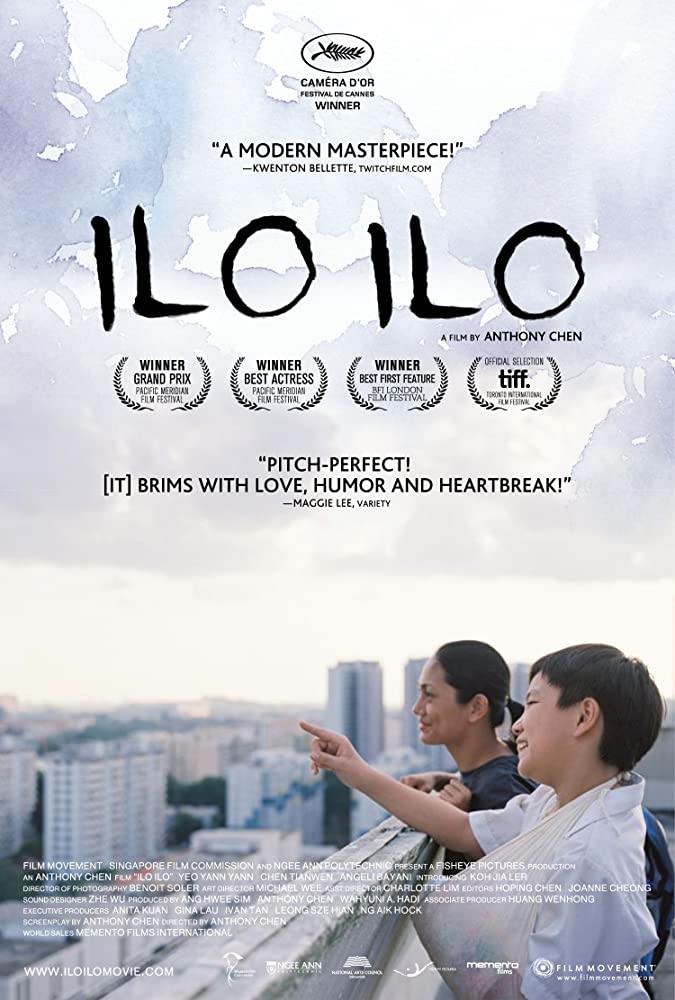Ilo Ilo, a local drama film directed by Anthony Chen, is the first Singaporean film to be awarded the Caméra d’Or award at the Cannes Film Festival. Set in 1997 Singapore, during the Asian Financial Crisis, the heartwarming film follows the life of the Lim family.
The focal character, Teresa (Angeli Bayani), is a live-in Filipina domestic helper in the Lim family. She assists Hwee Leng (Yeo Yann Yann), the pregnant mother, in the daily household chores. Next, viewers are introduced to the ten-year-old son, Jia Le (Koh Jia Ler) who is a troublemaking, petulant child. Subsequently, we are shown a tense relationship between Teresa and Jia Le, the ill-tempered boy had enjoyed creating troubles for the frustrated helper.
Teck (Chen Tianwen), the reticent father and the head of the family, is shown to lose his job amid this crucial time. Perhaps a common trait of a patriarch, Teck concealed the fact from his wife and kept his troubles to himself. In desperation, Teck turned to the stock market which resulted in further financial losses. When he had finally admitted the truth to Hwee Leng, the latter was less than understanding and criticised him rather severely. The familial relationships were additionally strained with Jia Le aggravating the family with his churlish acts.
With the death of a neighbour, Jia Le and Teresa formed a new friendship over the sudden, profound loss. Jia Le is taken to Teresa, the latter who is genuine and loving in her speech and actions. It is evident that Jia Le is fond of Teresa now, possibly seeing his helper more of a mother when Hwee Leng is constantly occupied with work. This sparks an unease in the pregnant mother when Hwee Leng felt a pang of jealousy over their close ties. Such situations are not uncommon in Singapore, especially for working parents who have to juggle between career and family, leading to their children inevitably forming a closer bond with their caretakers.
Next, the film pans to Hwee Leng who was swindled out of money by a motivational speaker, purchasing a whole catalogue of fake products in the hope of a better life. This, too, is in reflection of the underhanded yet sophisticated techniques of real-life swindlers preying on the fragile minds of stressed individuals.
Jia Le, facing numerous troubles in school including being bullied, is threatened to be expelled from school after he engaged in a fight. When Hwee Leng showed up to retrieve his child, she reminded Teresa who had rushed there first, albeit condescendingly, that she is the mother. This scene had made my heart ache a little, as it is clear that Teresa loves Jia Le unconditionally as well, with no imperious motive behind her feelings.
In the end, the Lim family has decided to terminate Teresa’s employment as they could no longer afford the fees. Jia Le is frantic, he does not want Teresa to leave, going so far as to spend all his savings on lottery tickets that resulted in naught. The iconic scene is shown, Jia Le cut a lock of Teresa’s hair to keep as a memorabilia, giving a tearful goodbye to his beloved caretaker.
The film perfectly replicates the problems a middle-class Asian family would face, and it is relatable by many growing up in such households. A struggling father to keep the family afloat by himself, a mother who is trying her best to achieve a work-life balance, and a child who simply wants to be loved. Reflecting the status quo in the 1990s, Ilo Ilo has cleverly woven in the nervous fates of the older generation as they faced uncertainty in the times of retrenchment.
“No room for your God here” is a line that holds considerable weight in the film, highlighting the difficulties a domestic helper experiences and their loss of identity in foreign land. The feeling of unease and fear in these helpers that move to Singapore alone, under the watching distrustful eyes of their employers, is palpable from Teresa’s character. Angeli has brilliantly conveyed the character of Teresa, she is but only a woman who simply misses her family very much and wants a better life for them.
Ilo Ilo’s use of temporal realism allows the viewers to experience life in 1990s Singapore, evoking our emotions as we step into the four well-written and well-acted characters’ shoes temporarily. It is an excellent film depicting the uncertain times of Singapore in the past, and more than anything, Ilo Ilo teaches us to appreciate the people we have by our side.














